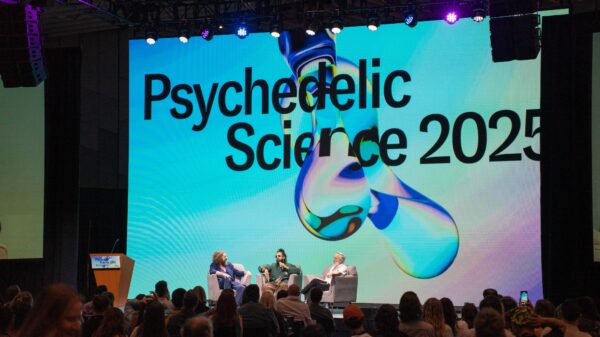The University of California, Berkeley wants to add to the psychedelic research revival with a unique focus on public education and spirituality.
This week, the school launched the UC Berkeley Center for the Science of Psychedelics for scientists to conduct clinical trials using psychedelics “to investigate cognition, perception and emotion and their biological bases in the human brain.”
Supported by US$1.25 million in funding from an anonymous donor, the centre will develop education programs and a website to inform the public about this rapidly advancing field. Its content will cover scientific, political, business and cultural developments in psychedelics, according to a statement.
While advancing modern science, UC Berkeley researchers say new studies will include spiritual aspects found in the ancient, ritual uses of psychedelic plants.
There’s never been a better time to start a centre like this, says co-founder and UC Berkeley neuroscientist David Presti.
“The renewal of basic and clinical science with psychedelics has catalyzed interest among many people,” he said in the statement.
50 years after political & cultural winds slammed shut the doors on psychedelic research, Berkeley is making up for lost time by launching the campus’s first center for psychedelic science & public education. 🍄@UCBerkeleyNeuro https://t.co/lIdtG3KOkR
— UC Berkeley (@UCBerkeley) September 14, 2020
The new centre will look to compliment ongoing clinical studies around the world.
Last year, the Johns Hopkins University School of Medicine in Maryland launched its Center for Psychedelic and Consciousness Research, which it touts as the first of its kind in the U.S., and the world’s largest. Johns Hopkins has published dozens of studies that integrate psilocybin and other psychedelic compounds with psychotherapy to treat conditions including anxiety, depression, post-traumatic stress disorder and problematic substance use.
“Some of these studies have produced striking results in cases that are otherwise resistant to more conventional medical treatment. This suggests that psychedelic compounds may offer new hope for people suffering from these disorders,” said Michael Silver, neuroscientist and inaugural director at UC Berkeley’s psychedelic centre.
UC Berkeley says initial studies will use psilocybin, the principal psychoactive compound in magic mushrooms, to tackle the lack of scientific knowledge on how brain mechanisms interact with psychedelic compounds in treating mental health conditions. The researchers also want to address a dearth of understanding on how these compounds improve cognitive flexibility, alter visual perception, induce feelings of awe and change patterns of brain activity.
Read more: Shroom for science with Johns Hopkins University
To investigate these questions, Silver hopes to receive additional funding that can help Berkeley researchers expand beyond the fields of psychology and neuroscience, moving further into philosophy, religion, anthropology, art, computer science and artificial intelligence.
UC Berkeley to train psychedelic guides
The centre’s founders say they will team up with an independent group of theological institutes in the San Francisco Bay Area to develop an immersive learning program on psychedelics and spirituality.
The program will focus on supporting volunteer participants as they undergo psychedelic experiences as part of the centre’s research. To do that, the program will train guides to aid research subjects with the cultural and spiritual care aspects of psychedelic use.
Given the rapidly growing number of psychedelic studies, there aren’t enough trained facilitators to meet the demand, according to the founders.
“The training of facilitators is an indispensable part of this project,” says Sam Shonkoff, an assistant professor of Jewish studies at the Graduate Theological Union who is collaborating with the centre.
The Berkeley researchers will bring in experts on the ritual use of psychedelic plants who will be involved in creating an in-depth learning program for research participants, as well as designing the training program.
Other co-founders include journalism professor and acclaimed author Michael Pollan, who will be in charge of the public education component.
Pollan wrote the 2018 bestseller How to Change Your Mind: What the New Science of Psychedelics Teaches Us About Consciousness, Dying, Addiction, Depression and Transcendence after he tried psychedelics for the first time in his middle years.
He sees the substances as a key for middle-aged people who have struggled to overcome trauma in their lives.
“Psychedelics have a particular value later in life, because that is when you are most stuck in your patterns. They give you the ability to shake them loose,” he says.
Top image via Imperial College London
jared@mugglehead.com
@JaredGnam















Jody Ellsworth
March 17, 2021 at 8:12 pm
I am extremely interested in the prospect of training as a guide. I am a72 year old male. I have suffered from chronic depression most of my adult life. I have experienced my share of trauma in my life, including physical abuse as a child, the suicide of my high school sweetheart, the breakup of my marriage/family , etc. I have a BA in Psychology from UCB and a MA from SFSU in Interdisciplinary Arts; my Masters thesis explored the relationship between Creativity and Trauma. I currently reside in the Bay Area. I have been exposed to psychedelics in my past, including Mescalin, LSD and Psilocybin. I consider these substances to be sacred and my experiences with them as deeply spiritual. However, absent the proper preparation and follow up integration, these experiences have not relieved me of the symptoms of PTSD that have plagued me for so many years, specifically chronic depression and occasional suicidal ideation. I am currently researching psychedelic assisted therapies in my quest to be relieved of this lifelong suffering. I look forward to your response.